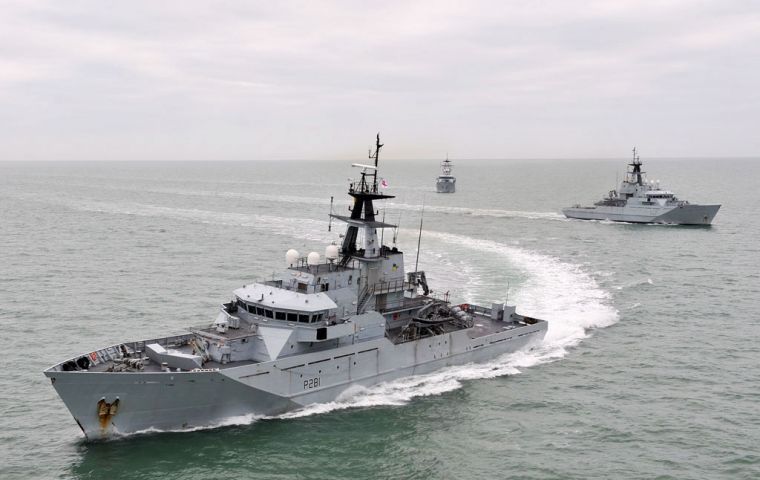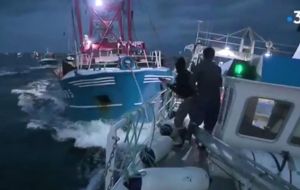MercoPress. South Atlantic News Agency
UK expanding fisheries protection to police territorial waters in a no-Brexit trade-deal scenario
 The Royal Navy's current UK Fishery Protection Squadron (FPS) fleet is currently made up of just three River-class offshore patrol vessels and a helicopter (Pic RN)
The Royal Navy's current UK Fishery Protection Squadron (FPS) fleet is currently made up of just three River-class offshore patrol vessels and a helicopter (Pic RN)  Its ships patrol 80,000 square miles of sea off Britain protecting the country’s fishing rights.
Its ships patrol 80,000 square miles of sea off Britain protecting the country’s fishing rights.  Last year, French fishermen allegedly attacked Devon-based fishing boats with petrol bombs, as a shellfish 'war' hotted up in the English Channel.
Last year, French fishermen allegedly attacked Devon-based fishing boats with petrol bombs, as a shellfish 'war' hotted up in the English Channel. The British government is hiring additional ships for the Royal Navy amid growing Brexit tensions - with reports as many as 24 extra boats could be drafted into service. The Times reports that “Ministers are getting ready to triple the number of boats in Britain’s fisheries protection squadron to police territorial waters in the event of a no-trade-deal Brexit”.
While the UK has officially left the EU and no longer has any influence over EU rules and regulations, it must still follow and enforce EU fisheries legislation and other EU laws until December 31 of this year, under the terms of the withdrawal agreement.
Along with the Daily Mail and the Express, The Times reports that the UK Government has given the go-ahead to hire two more maritime protection ships and two aerial surveillance aircraft to be operational by the end of the year.
The Express says, “It has also earmarked a further 22 boats that can be deployed at short notice and recruited an extra 35 enforcement officers with the power to issue search warrants.”
Meanwhile, The Mail reports: “Growing tension over future fishing access is likely to spark fears of a repeat of the so-called 'scallop wars' in 2018 which saw French and British boats angrily clash over access to shellfish off the coast of Normandy”.
Last year, French fishermen allegedly attacked Devon-based fishing boats with petrol bombs, as a shellfish 'war' hotted up in the English Channel.
Smoke bombs, rocks and insults were also allegedly hurled at fisherman from Devon.
“The UK is taking steps to prepare for all eventualities, with the government having reportedly hired two extra ships to provide additional help to the Royal Navy Fishery Protection Squadron's current four ship fleet.”
The Royal Navy's current UK Fishery Protection Squadron (FPS) fleet is currently made up of just three River-class offshore patrol vessels and a helicopter. Its ships patrol 80,000 square miles of sea off Britain protecting the country’s fishing rights.
The FPS has a secondary role carrying out inspections of all fishing boats in UK waters and acting as an arbitrator between rival vessels when disputes arise.
Regaining control of Britain’s rich fishing waters was a totemic issue for many Brexit campaigners before the country formally left the bloc last Friday.
But the EU has some leverage with many British fishing communities rely heavily on selling to EU markets, particularly for shellfish.
Mr Johnson has told the EU the Government is ready to consider an agreement with Brussels but stressed: “It must reflect the fact that the UK will be an independent coastal state from the end of this year, controlling our own waters.
“Under such an agreement there would be annual negotiations with the EU, using the latest scientific data, ensuring British fishing grounds are first and foremost for British boats.”
The Royal Navy says its Offshore Patrol Vessels “conduct fishery protection duties and safeguard the integrity of the UK's territorial waters”.
The River Class patrol ships can be used for anything from fire-fighting to disaster relief operations. “HMS Tyne, HMS Mersey and HMS Severn have a crew of about 45 sailors, working at least 275 days a year at sea enforcing British and European fisheries law”.




Top Comments
Disclaimer & comment rulesCommenting for this story is now closed.
If you have a Facebook account, become a fan and comment on our Facebook Page!